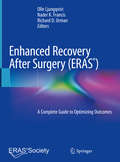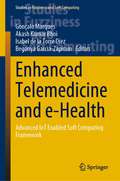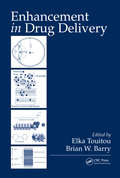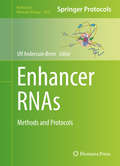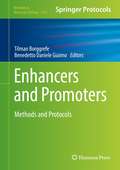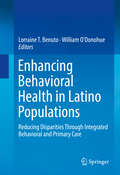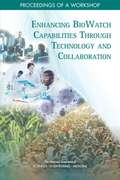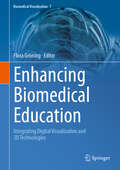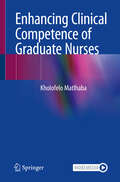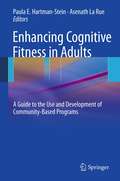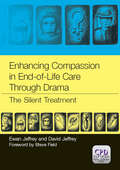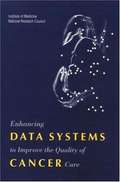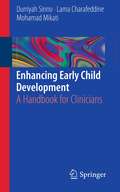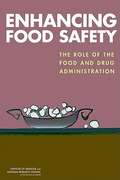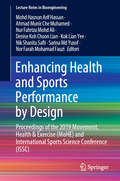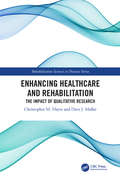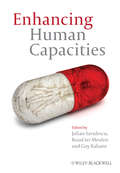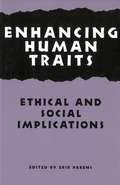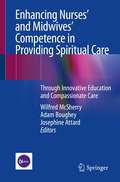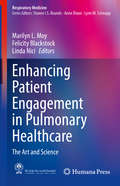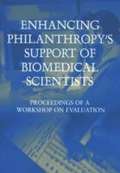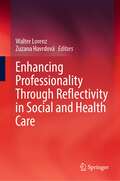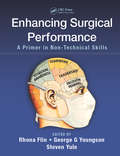- Table View
- List View
Englishman at Dingo Creek
by Lucy ClarkDr Dannyella Thompson needed help with her practice, but an English doctor at Dingo Creek? She was expecting more amusement than assistance But Dr Sebastian MacKenzie proved Dannyella wrong. By the time his two week stay was up he'd won her over - in every way
Enhanced Recovery After Surgery: A Complete Guide to Optimizing Outcomes
by Richard D. Urman Olle Ljungqvist Nader K. FrancisThis book is the first comprehensive, authoritative reference that provides a broad and comprehensive overview of Enhanced Recovery After Surgery (ERAS). Written by experts in the field, chapters analyze elements of care that are both generic and specific to various surgeries. It covers the patient journey through such a program, commencing with optimization of the patient’s condition, patient education, and conditioning of their expectations. Organized into nine parts, this book discusses metabolic responses to surgery, anaesthetic contributions, and optimal fluid management after surgery. Chapters are supplemented with examples of ERAS pathways and practical tips on post-operative pain control, feeding, mobilization, and criteria for discharge. Enhanced Recovery After Surgery: A Complete Guide to Optimizing Outcomes is an indispensable manual that thoroughly explores common post-operative barriers and challenges.
Enhanced Telemedicine and e-Health: Advanced IoT Enabled Soft Computing Framework (Studies in Fuzziness and Soft Computing #410)
by Akash Kumar Bhoi Gonçalo Marques Isabel de la Torre Díez Begonya Garcia-ZapirainIn recent years, new applications on computer-aided technologies for telemedicine have emerged. Therefore, it is essential to capture this growing research area concerning the requirements of telemedicine. This book presents the latest findings on soft computing, artificial intelligence, Internet of Things and related computer-aided technologies for enhanced telemedicine and e-health. Furthermore, this volume includes comprehensive reviews describing procedures and techniques, which are crucial to support researchers in the field who want to replicate these methodologies in solving their related research problems. On the other hand, the included case studies present novel approaches using computer-aided methods for enhanced telemedicine and e-health. This volume aims to support future research activities in this domain. Consequently, the content has been selected to support not only academics or engineers but also to be used by healthcare professionals.
Enhancement in Drug Delivery
by Elka Touitou Brian W. BarryProviding a significant cross-fertilization of ideas across several disciplines, Enhancement in Drug Delivery offers a unique comprehensive review of both theoretical and practical aspects of enhancement agents and techniques used for problematic administration routes. It presents an integrated evaluation of absorption enhancers and modes fo
Enhancer RNAs
by Ulf Andersson ØromThis volume provides a comprehensive overview of the experimental and computational methodologies used to study the function of long non-coding RNA (ncRNAs) expressed from enhancers. Chapter detail both wet-lab and dry-lab techniques and annotating long ncRNAs and exploring transcription by assessing where transcription starts and generally how it occurs.Written in the highly successful Methods in Molecular Biology series format, chapters include introductions to their respective topics, lists of the necessary materials and reagents, step-by-step, readily reproducible laboratory protocols, and tips on troubleshooting and avoiding known pitfalls. Authoritative and cutting-edge, Enhancer RNAs: Methods and Protocols aims to ensure successful results in this rapidly developing field.
Enhancers and Promoters: Methods and Protocols (Methods in Molecular Biology #2351)
by Tilman Borggrefe Benedetto Daniele GiaimoThis volume contains cutting-edge techniques to study the function of enhancers and promoters in depth. Chapters are divided into six sections and describe enhancer-promoter transcripts, nucleosome occupancy, DNA accessibility, chromatin interactions, protein-DNA interactions, functional analyses, and DNA methylation assays. Written in the Methods in Molecular Biology series format, chapters include comprehensive introductions, lists of the necessary materials and reagents, step-by-step laboratory protocols, and useful suggestions for troubleshooting.Authoritative and cutting-edge, Enhancers and Promoters: Methods and Protocols is a useful guide for future experiments.
Enhancing Behavioral Health in Latino Populations
by William O'Donohue Lorraine T. BenutoThis timely volume examines the potential of integrated care in providing effective, accessible behavioral healthcare for Latino clients. The integrated care model is discussed in practical terms, with guidelines for the addressing the needs of Latinos in a coordinated, patient-focused setting. Specific points of attention include common behavioral and medical/mental health conditions (e. g. , depression, chronic pain, tobacco use), special considerations in working with Puerto Rican and Cuban clients, and recommendations for working with children. These important issues are considered against the backdrop of opportunities and challenges inherent in integrated care and its implementation, in addition to the relevance of evidence-based interventions for this large and diverse population. Among the topics covered: Latino trends and health policy: from walking on eggshells to commitment Integrated health care for Latino immigrants and refugees: what do they need? Using a translator in integrated care settings Enhancing and improving treatment engagement with Hispanic patients Integrated depression care among Latinos Chronic disease management and integrated care among Hispanic populations Health psychologists, social workers, family physicians, and clinical psychologists will find Enhancing Behavioral Health in Latino Populations an important resource for their professional development, as well as part of the ongoing movement toward reduced disparities and more inclusive and culturally attuned care.
Enhancing BioWatch Capabilities Through Technology and Collaboration: Proceedings of a Workshop
by Engineering Medicine National Academies of SciencesThe Department of Homeland Security’s (DHS’s) BioWatch program aims to provide an early indication of an aerosolized biological weapon attack. The first generation of BioWatch air samplers were deployed in 2003. The current version of this technology, referred to as Generation 2 (Gen-2), uses daily manual collection and testing of air filters from each monitor, a process that can take 12 to 36 hours to detect the presence of biological pathogens. Until April 2014, DHS pursued a next-generation autonomous detection technology that aimed to shorten the time from sample collection to detection to less than 6 hours, reduce the cost of analysis, and increase the number of detectable biological pathogens. Because of concerns about the cost and effectiveness of the proposed Generation 3 system (Gen-3), DHS cancelled its acquisition plans for the next-generation surveillance system. In response to the cancellation announcement, Congress asked the Government Accountability Office (GAO) to conduct a review of the program and the proposed system enhancements that would have been incorporated in BioWatch Gen-3. However, Mike Walter, BioWatch Program manager, Office of Health Affairs, DHS, said that DHS did not agree with all of GAO’s characterizations of the BioWatch program efforts described in this review. In response to this, DHS requested that the National Academies of Sciences, Engineering, and Medicine conduct a workshop to further explore the findings of the 2015 GAO report and discuss the impact these findings may have with regard to the future development of the technical capabilities of the BioWatch program. Workshop participants also discussed existing and possible collaborations between BioWatch, public health laboratories, and other stakeholders that could contribute to the enhancement of biosurveillance capabilities at the federal, state, and local levels. This publication summarizes the presentations and discussions from the workshop.
Enhancing Biomedical Education: Integrating Digital Visualization and 3D Technologies (Biomedical Visualization #7)
by Flora GröningThis edited book explores digital visualization as a tool to communicate complex and often challenging biomedical content in an accessible and engaging way. The reader will learn how current visualization technology can be applied to a wide range of biomedical fields to benefit the learning of students and enhance the public understanding of science. The focus of this volume will be on the innovative use of digital visualization (2D or 3D) in biomedical education and public engagement. This includes medical imaging (i.e., magnetic resonance imaging and computed tomography) as well as other digital imaging techniques such as laser scanning. It also covers the use of state-of-the-art visualization tools (i.e., augmented and virtual reality, animations and 3D printing) and the integration of 3D models of anatomical structures into serious computer games. This book will appeal to educators, researchers and students in life science subjects as well as to healthcare professionals and designers of digital learning resources. The book will be a source of inspiration for any reader who is interested in using digital visualization as a meaningful and engaging communication tool for biomedical content, ranging from the anatomy and function of organs to the mechanisms of diseases and their prevention.
Enhancing Clinical Competence of Graduate Nurses
by Kholofelo MatlhabaThis book aims to enhance new graduate nurses’ skills and prepare them for the demands and challenges of their profession. It addresses not only the technical aspects of nursing practice but also emphasizes clinical skills such as critical thinking, effective communication, cultural competence skills, mentorship and support, and technology integration. It can be used by new nurses, nurse educators, clinical instructors, mentors, in both private and public hospitals during the onboarding or orientation programs. This book goes beyond the theoretical knowledge taught in nursing programs and provides practical strategies and insights to help new nurses thrive. Enriched with Flashcards in each chapter, this book is a unique educational tool, which recognizes the importance of bridging the gap between theory and practice and offers practical guidance to help new nurses navigate this transition successfully. It also highlights the importance of continuing education and transition strategies such as mentorship programs to support ongoing growth and development as a nurse. Finally, the book concentrates on the importance of cultural competence in nursing practice and provides strategies for developing cultural awareness, sensitivity, and competence in new graduate nurses. Test your knowledge with questions and answers about the book with Springer Nature Flashcards!
Enhancing Cognitive Fitness in Adults
by Asenath Larue Paula E. Hartman-SteinLate life is characterized by great diversity in memory and other cognitive functions. Although a substantial proportion of older adults suffer from Alzheimer's disease or another form of dementia, a majority retain a high level of cognitive skills throughout the life span. Identifying factors that sustain and enhance cognitive well-being is a growing area of original and translational research. In 2009, there are as many as 5.2 million Americans living with Alzheimer's disease, and that figure is expected to grow to as many as 16 million by 2050. One in six women and one in 10 men who live to be at least age 55 will develop Alzheimer's disease in their remaining lifetime. Approximately 10 million of the 78 million baby boomers who were alive in 2008 can expect to develop Alzheimer's disease. Seventy percent of people with Alzheimer's disease live at home, cared for by family and friends. In 2008, 9.8 million family members, friends, and neighbors provided unpaid care for someone with Alzheimer's disease or another form of dementia. The direct costs to Medicare and Medicaid for care of people with Alzheimer's disease amount to more than $148 billion annually (from Alzheimer's Association, 2008 Alzheimer's Disease Facts and Figures). This book will highlight the research foundations behind brain fitness interventions as well as showcase innovative community-based programs to maintain and promote mental fitness and intervene with adults with cognitive impairment. The emphasis is on illustrating the nuts and bolts of setting up and utilizing cognitive health programs in the community, not just the laboratory.
Enhancing Compassion in End-of-Life Care Through Drama: The Silent Treatment
by David Jeffrey Ewan Jeffrey'Healthcare professionals spend much of their time listening to stories of sickness related by patients and their families. It thus seems appropriate that drama, which is primarily concerned with exploring narratives, change and crises and relies, like the clinical situation, on communication, is an ideal medium for healthcare professionals to gain new insights into care.' From the Introduction Good communication forms the heart of patient-centred care and is the cornerstone of a trusting relationship. Enhancing Compassion in End-of-Life Care Through Drama explores a broad range of plays from Greek tragedy to the present day and investigates how particular theatrical dynamics help to understand complexities in the setting of end-of-life care. It examines fresh ways to interpret the action and subtext represented on the stage and finds symmetries in a clinical context. It is ideal for use in a range of educational contexts, with practical ideas for workshops and summaries of key concepts in each chapter. This book will motivate all members of the multidisciplinary palliative care team including palliative care professionals, doctors, nurses, psychologists, spiritual advisers and social workers. Although based in the setting of palliative care, the learning points are relevant to all areas of clinical practice.
Enhancing Data Systems to Improve the Quality of Cancer Care
by Institute of MedicineOne of the barriers to improving the quality of cancer care in the United States is the inadequacy of data systems. Out-of-date or incomplete information about the performance of doctors, hospitals, health plans, and public agencies makes it hard to gauge the quality of care. Augmenting today's data systems could start to fill the gap.This report examines the strengths and weaknesses of current systems and makes recommendations for enhancing data systems to improve the quality of cancer care. The board's recommendations fall into three key areas: Enhance key elements of the data system infrastructure (i.e., quality-of-care measures, cancer registries and databases, data collection technologies, and analytic capacity). Expand support for analyses of quality of cancer care using existing data systems. Monitor the effectiveness of data systems to promote quality improvement within health systems.
Enhancing Early Child Development
by Lama Charafeddine Mohamad Mikati Durriyah SinnoEarly childhood development refers to the skills that children acquire within their first five years of life, which lay the foundation for future learning. Children need care and support to stimulate their growth and healthy development. The stimulation of language, understanding, personal, social and motor skills of the child are important at an early age and it is one of the primary physicians' responsibilities to give proper advice to parents on how to promote their children's physical and mental development. Enhancing Early Child Development: A Handbook for Clinicians is a quick reference guide for pediatricians, clinicians, and pediatric nurse practitioners that aims at promoting early stimulation and intervention for optimizing development of normal children as well as children with cerebral palsy and autism. Designed to be used in daily practice, this book will provide counsel for clinicians, parents and caregivers and advise them on the appropriate methods to enhance their child's development at different ages based on their health condition. In addition, Enhancing Early Child Development: A Handbook for Clinicians, incorporates a summary of the manual entitled "Counsel the Family on Care for Child Development" developed by UNICEF and WHO, which addresses child development in low resource countries.
Enhancing Environmental Education Through Nature-Based Solutions (Integrated Science #4)
by Clara Vasconcelos Cristina S. C. CalheirosThis Book presents innovative and state of the art studies developed in Environmental Education in different countries to highlight this theme and promote its implementation all over the world. It will give a scientific perspective of Nature-based solutions to promote environmental education in all citizens and a more educational perspective as to how this approach can be implemented at schools and universities. Not less important is that includes science communication as a key factor for training and disseminating about the environment. The invited authors are recognized experts with excellent work developed in Environmental Education.This contributed volume presents innovative and creative work in the area giving a step forward in the implementation of Environmental Education, namely as a target of 2020 United Nations Agenda for Sustainable Development. The invitation of authors from many different countries allows the creation of a network and subsequently the book will bring concrete ideas as to how to develop operational capacities to bring added values to Environmental Education at an international level.
Enhancing Food Safety: The Role of the Food and Drug Administration
by Institute of Medicine National Research Council of the National AcademiesRecent outbreaks of illnesses traced to contaminated sprouts and lettuce illustrate the holes that exist in the system for monitoring problems and preventing foodborne diseases. Although it is not solely responsible for ensuring the safety of the nation's food supply, the U.S. Food and Drug Administration (FDA) oversees monitoring and intervention for 80 percent of the food supply. The U.S. Food and Drug Administration's abilities to discover potential threats to food safety and prevent outbreaks of foodborne illness are hampered by impediments to efficient use of its limited resources and a piecemeal approach to gathering and using information on risks. Enhancing Food Safety: The Role of the Food and Drug Administration, a new book from the Institute of Medicine and the National Research Council, responds to a congressional request for recommendations on how to close gaps in FDA's food safety systems. Enhancing Food Safety begins with a brief review of the Food Protection Plan (FPP), FDA's food safety philosophy developed in 2007. The lack of sufficient detail and specific strategies in the FPP renders it ineffectual. The book stresses the need for FPP to evolve and be supported by the type of strategic planning described in these pages. It also explores the development and implementation of a stronger, more effective food safety system built on a risk-based approach to food safety management. Conclusions and recommendations include adopting a risk-based decision-making approach to food safety; creating a data surveillance and research infrastructure; integrating federal, state, and local government food safety programs; enhancing efficiency of inspections; and more. Although food safety is the responsibility of everyone, from producers to consumers, the FDA and other regulatory agencies have an essential role. In many instances, the FDA must carry out this responsibility against a backdrop of multiple stakeholder interests, inadequate resources, and competing priorities. Of interest to the food production industry, consumer advocacy groups, health care professionals, and others, Enhancing Food Safety provides the FDA and Congress with a course of action that will enable the agency to become more efficient and effective in carrying out its food safety mission in a rapidly changing world.
Enhancing Health and Sports Performance by Design: Proceedings of the 2019 Movement, Health & Exercise (MoHE) and International Sports Science Conference (ISSC) (Lecture Notes in Bioengineering)
by Mohd Hasnun Arif Hassan Ahmad Munir Che Muhamed Nur Fahriza Mohd Ali Denise Koh Choon Lian Kok Lian Yee Nik Shanita Safii Sarina Md Yusof Nor Farah Mohamad FauziThis book gathers papers presented at the 2019 Movement, Health & Exercise (MoHE) Conference and International Sports Science Conference (ISSC). The theme of this year’s conference was "Enhancing Health and Sports Performance by Design". The content covers (but is not limited to) the following topics: exercise science; human performance; physical activity & health; sports medicine; sports nutrition; management & sports studies; and sports engineering & technology.
Enhancing Healthcare and Rehabilitation: The Impact of Qualitative Research (Rehabilitation Science in Practice Series)
by Christopher M. Hayre Dave J. MullerSummary Description This book is primarily a celebration of the qualitative work undertaken internationally by a number of experienced researchers. It also focuses on developing the use of qualitative research for health and rehabilitative practitioners by recognizing its value methodologically and empirically. We find that the very nature of qualitative research offers an array of opportunities for researchers in being able to understand the social world around us. Further, through experience and discussion, this book identifies the multifaceted use of qualitative methods in the healthcare and rehabilitative setting. This book touches on the role of the researcher, the participants involved, and the research environment. In short, we see how these three central elements can affect the nature of qualitative work in attempts to offer originality. This text speaks to a number of audiences. Students who are writing undergraduate dissertations and research proposals, they may find the myriad of examples stimulating and may support the rationale for methodological decisions in their own work. For academics, practitioners, and prospective qualitative researchers this book also aims to demonstrate an array of opportunism in the field of qualitative research and how they may resonate with arguments proffered. It is anticipated that readers will find this collection of qualitative examples not only useful for informing their own research, but we also hope to enlighten new discussions and arguments regarding both methodological and empirical use of qualitative work internationally. Features Encompasses the importance of qualitative research and how it can be used to facilitate healthcare and rehabilitation across a wide range of health conditions. Evaluates empirical data whilst critically applying it to contemporary practices. Provides readers with an overview with future directions and influence policy makers in order to develop practice. Focuses on an array of health conditions that can affect groups of the population, coincided with life issues and the care and family support received. Offers innovative methodological insights for prospective researchers in order to add to the existing evidence base.
Enhancing Human Capacities
by Guy Kahane Julian Savulescu Ruud Ter MeulenEnhancing Human Capacities is the first to review the very latest scientific developments in human enhancement. It is unique in its examination of the ethical and policy implications of these technologies from a broad range of perspectives.Presents a rich range of perspectives on enhancement from world leading ethicists and scientists from Europe and North AmericaThe most comprehensive volume yet on the science and ethics of human enhancementUnique in providing a detailed overview of current and expected scientific advances in this areaDiscusses both general conceptual and ethical issues and concrete questions of policyIncludes sections covering all major forms of enhancement: cognitive, affective, physical, and life extension
Enhancing Human Traits: Ethical and Social Implications
by Erik ParensIn this volume, scholars from philosophy, sociology, history, theology, women's studies, and law explore the looming ethical and social implications of new biotechnologies that are rapidly making it possible to enhance an individual's mental and physical attributes in ways previously only imagined. To clarify the issues, the contributors grapple with the central concept of "enhancement" and probe the uses and abuses of the term. Focusing in particular on the moral issues pertaining to cosmetic surgery and cosmetic psychopharmacology (a category which includes Prozac), they also examine notions of identity, authenticity, normality, and complicity. Other essays in this collection address the social ramifications of the new technologies, including the problems of access and fairness.
Enhancing Nurses’ and Midwives’ Competence in Providing Spiritual Care: Through Innovative Education and Compassionate Care
by Wilfred McSherry Adam Boughey Josephine AttardThis book is the first of its kind, addressing key issues in the teaching and learning of spirituality and spiritual care in the context of nursing and midwifery practice. The content is based on the outcomes of a European-wide project (EPICC) that brought together leading nursing and midwifery educators and practitioners from 21 countries. It highlights the importance of ensuring student nurses’ and midwives receive sufficient educational preparation to provide spiritual/person-centred care. In turn, the book puts forward an innovative and creative approach to the teaching of spiritual/person-centred care, based on an evaluation of best practice across Europe. The content and activities presented will enable nursing and midwifery educators to acquire new knowledge/skills for learning about and teaching on the personal, religious and spiritual aspects of person-centred care. Both interactive and engaging, it will equip nursing and midwifery students to holistically address the needs of the people they care for. The book has the potential to transform the nursing and midwifery workforce of the future by ensuring they are prepared to face the global challenges that are impacting international nursing and midwifery practice.
Enhancing Patient Engagement in Pulmonary Healthcare: The Art and Science (Respiratory Medicine)
by Linda Nici Marilyn L. Moy Felicity BlackstockThis book examines the most up-to-date strategies that can be used to enhance the healthcare professional-patient interaction to influence positive behavior change and improve treatment adherence in pulmonary healthcare. This book is written by experts in the field who couple their experience with practical strategies (the art) with evidence-based theory (the science).Chapters discuss global concepts such as motivational interviewing on improving engagement and how to apply strategies to specific situations (for examples: smoking cessation, promoting physical activity, inhaler adherence, supplemental oxygen use, and non-invasive ventilation) commonly experienced on the front lines of caring for patients with pulmonary disorders. The textbook raises awareness of direct approaches and recent technological advances that healthcare professionals can use to support positive behavior change in their day-to-day clinical practice. Effective, patient-tailored self-management interventions are discussed, including the evidence for these interventions and ways to personalize the strategies to each patient’s unique needs. This book is an ideal guide for healthcare professionals working with patients experiencing chronic pulmonary conditions, including pulmonologists, primary care physicians, physician assistants, nurses, trainees, and the many allied health professionals involved in delivering care such as respiratory therapists, pharmacists, and behavioral psychologists. The concepts of this book can also be applied to the management of other chronic diseases such as coronary artery disease and diabetes mellitus.
Enhancing Philanthropy's Support Of Biomedical Scientists: Proceedings Of A Workshop On Evaluation
by National Academy of Sciences of the National AcademiesDuring an interval of 15 years, the Lucille P. Markey Charitable Trust spent over $500 million on four programs in the basic biomedical sciences that support the education and research of graduate students, postdoctoral fellows, junior faculty, and senior researchers. The Markey Trust asked the NRC to evaluate these programs with two questions in mind: “Were these funds well spent?” and “What can others in the biomedical and philanthropic communities learn from the programs of the Markey Trust, both as an approach to funding biomedical research and as a model of philanthropy?” One of five resulting reports, this volume contains the proceedings of a workshop held in June 2005 to investigate methods used to evaluate funding of the biomedical scientists by philanthropic and public funders. In addition to the Markey Trust, representatives from the Howard Hughes Medical Institute, the American Heart Association, the Doris Duke Charitable Foundation, the National Institutes of Health, and six other funders of biomedical scientists presented information on evaluation methodologies and outcomes.
Enhancing Professionality Through Reflectivity in Social and Health Care
by Walter Lorenz Zuzana HavrdováThis book discusses complex motivational conditions and strategies on macro, meso, and micro levels promoting reflectivity in interpersonal professional practice. The increasing demands made on practitioners in social and health services, as illustrated by the COVID-19 pandemic, can lead to great uncertainty over how to find "the right response" to complex expressions of need and how to account for ethical professional decisions in view of prevailing strategies of 'risk reduction' and managerial accounting. Reflectivity has been recognised as being of central importance for guiding practitioners towards situationally differentiated and accountable practice. However, it is a complex process made up not only of different psychological components and their interplay with educational and organisational contexts, but also of multilevel interactions and purely situational conditions that can have positive or negative effects. The individual and team reflectivity can be learned and supported through various educational and managerial opportunities, sensitively guided personal and professional experiences and specific patterns of interaction which are reviewed in the book. Reflective supervision in the workplace plays a pivotal role in enabling individual and team reflective processes. However, there are also social and organisational factors that can hinder the development of individual and team reflectivity. The particular value of this publication is that the authors focus on complex research findings from several consecutive studies and critically review and discuss the conditions for reflectivity from various perspectives and with the background of rich academic literature and research. Their research-derived empirical and analytical insights were submitted to managers and educators, and effective and realistic strategies and methods to enhance different levels of reflectivity in students and practitioners were discussed and are summarised in this volume. Among the topics covered: The significance of reflectivity in professional social and health care in relation to changing socio-political contexts Gender aspects of reflectivity in the social and healthcare field Operationalisation of reflectivity for research by personal, team and organisational scales Cultural and communicational patterns of interaction enabling professional reflective processes Enhancing Professionality Through Reflectivity in Social and Health Care is pertinent reading for professors of professional academic training programmes for social workers, nurses, supervisors, trainers in non-formal learning settings, students, and managers of social and health services with an interest in enhancing organisational cultures.
Enhancing Surgical Performance: A Primer in Non-technical Skills
by Rhona Flin Steven Yule George YoungsonEnhancing Surgical Performance: A Primer in Non-Technical Skills explains why non-technical skills are vital for safe and effective performance in the operating theatre. The book provides a full account, with supporting empirical evidence, of the Non-Technical Skills for Surgeons (NOTSS) system and behavioural rating framework, which helps identify the key elements involved in successful operative surgery. <P><P>The editors spent the last twelve years as part of the team developing and testing the NOTSS system and delivering presentations and workshops across the world. Readers will benefit by having, in one accessible handbook, a description of the NOTSS system and how it can be used for training, assessment, self-reflection and event analysis. <P><P>The book also examines human error, performance limitations, and global safety initiatives in surgery. Because it encourages surgeons to reflect on their own performance and behaviour, it is suitable for surgeons in all specialties and at all levels.

